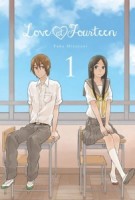Thanks to everyone who responded positively to last week’s inaugural Manga Revue! This week’s column focuses on Love at Fourteen, a romance manga that’s garnered good reviews around the web. I’ve also rounded up the week’s most notable manga criticism below. If you’d like to see your reviews here, leave a note in the comments.
 Love at Fourteen, Vol. 1
Love at Fourteen, Vol. 1
By Fuka Mizutani
Rated T, for Teens
Yen Press, $15.00
Love at Fourteen is an earnest, uneventful chronicle of first love. The teenagers in question are Tanaka and Yoshikawa, the tallest, smartest, and most responsible students at their middle school. Although they earn high marks and dutifully erase boards after class, they share a secret: they long to be as goofy and carefree as their peers. Their desire to cast off the yoke of maturity in favor of spontaneity becomes the catalyst for a chaste romance.
So far, so good: the premise has legs, and if Fuka Mizutani had better storytelling chops, Love at Fourteen might have offered young readers a meaningful alternative to the romantic histrionics of Kare First Love or Kare Kanno. Unfortunately, Mizutani relies heavily on interior monologues and pointed conversations to reveal what Tanaka and Yoshikawa are feeling, draining most of their scenes of tension, excitement, or ambiguity–the very qualities that make first love so memorable. Mizutani’s few attempts at generating drama fall painfully flat; moving Tanaka to a different row in the classroom hardly constitutes a meaningful impediment to her relationship with Yoshikawa, yet Mizutani dedicates two chapters to exploring the consequences of this new seating arrangement.
There’s nothing wrong with Mizutani’s commitment to charting the normal ups and downs of a teenage romance, of course; too many manga lean on false suitors, jealous rivals, or monstrous parents to prolong the inevitable union of the principle characters. Without a lively supporting cast, however, Love at Fourteen sinks under the weight of its principle characters’ personalities: doesn’t one of them play the bassoon or harbor a secret desire to break into voice acting? Generic artwork and stock scenes contribute to the impression of blandness, making this a tough sell for readers who demand more than from a story than sincerity.
The verdict: Tweens and young teens feel like the right audience for this book; older readers may find it too pat to hold their interest.
Reviews: Over at The Manga Test Drive, Megan R. takes two older titles for a spin: Cafe Kichijouji De and V.B. Rose. Shaenon Garrity devotes the latest House of 1000 Manga column to Taiyo Matsumoto’s Sunny.
Matthew Warner on vol. 3 of Ajin: Demi-Human (The Fandom Post)
Leroy Douresseaux on vol. 4 of Assassination Classroom (Comic Book Bin)
Rebecca Silverman on vol. 10 of Black Lagoon (ANN)
John Rose on vol. 2 of Bloody Brat (The Fandom Post)
Leroy Douresseaux on vol. 13 of Blue Exorcist (Comic Book Bin)
Erica Friedman on Chou Chou Nan Nan (Okazu)
Kate O’Neil on vol. 2 of Demon From Afar (The Fandom Post)
Sakura Eries on vol. 16 of Dengeki Daisy (The Fandom Post)
Sean Gaffney on vol. 1 of Emma (A Case Suitable for Treatment)
A Library Girl on vol. 1 of Inu x Boku SS (A Library Girl’s Familiar Diversions)
A Library Girl on vol. 2 of Inu x Boku SS (A Library Girl’s Familiar Diversions)
Sheena McNeil on vol. 17 of Kamisama Kiss (Sequential Tart)
Ian Wolf on vol. 1 of Let’s Dance a Waltz (Anime UK News)
Helen on Lucifer and the Biscuit Hammer (Organization Anti-Social Geniuses)
Nick Creamer on vols. 3-4 of Lucifer and the Biscuit Hammer (ANN)
Ken H. on vol. 2 of My Neighbor Seki (Sequential Ink)
Matthew Warner on vol. 74 of One Piece (The Fandom Post)
Ian Wolf on vol. 1 of Oreimo: Kuroneko (Anime UK News)
G.B. Smith on vol. 7 of Seven Deadly Sins (The Fandom Post)
G.B. Smith on vol. 8 of Seven Deadly Sins (The Fandom Post)
Matthew Warner on vol. 5 of Terra Formars (The Fandom Post)
Sheena McNeil on vol. 1 of Tokyo Ghoul (Sequential Tart)
manjiorin on Tony Takezaki’s Neon Genesis Evangelion (Organization Anti-Social Geniuses)
Sarah on vol. 1 of The World’s Greatest First Love (Anime UK News)
Great review! It’s interesting to see you compare Love at Fourteen to shoujo manga. I think it’s closer akin to josei, or even seinen. I’m personally quite attached to it as a gentle slice-of-life for grim days, but it is easy to see how others would find it dull.
Hi, Olivia–thanks for the comment!
I think Love at Fourteen was originally serialized in Rakuen Le Paradis, which would make it josei. As far as I’m aware, most of the “first love” manga that have been licensed in the US have been marketed as shojo, even if they were josei–hence the comparisons with Kare First Love. Your point is well taken, though, because Love at Fourteen reads more like manga for adults than manga for young teens. The pacing and artwork reminded me a little of Bunny Drop, even though the subject matter was different.